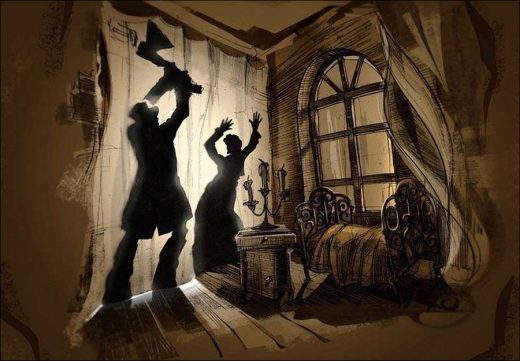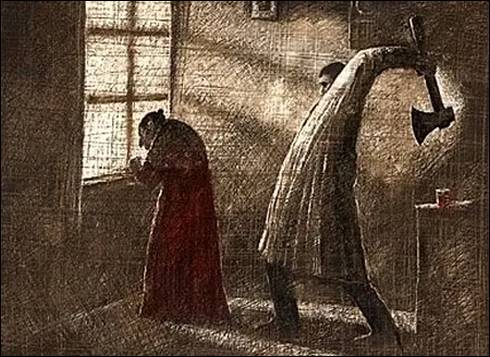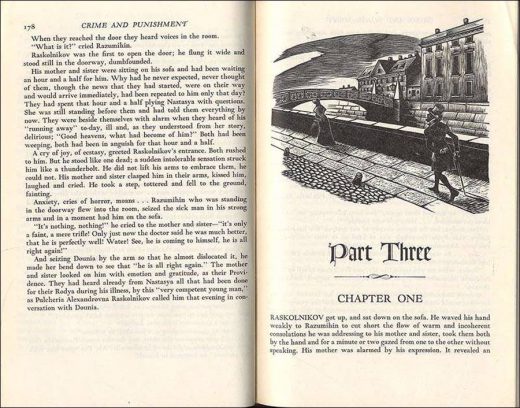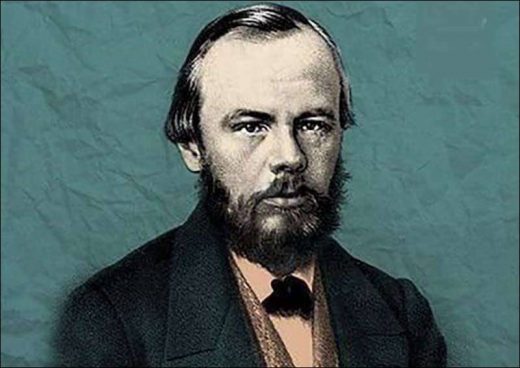Borges describes Crime and Punishment as “a novel whose protagonists are a murderer and a whore,” and adds: “It struck me as more devastating and fascinating than the war around us.”
What drives someone to kill in cold blood? What goes through the murderer’s mind? And what kind of a society breeds such people? Over 150 years ago Fyodor Mikhailovich Dostoyevsky took these questions up in what would become one of the best-known works of Russian literature: “Crime and Punishment.” We dig into the classic novel’s exploration of alienation, morality and redemption on this article.
Classics… Crime and Punishment… Dostoyevsky… “How can I read the 700-page book, do I have time?” “I watch the movie Go.” “E summary is everywhere.” It is not unusual to make these sentences in the internet age, where information is now presented to us like a pill. However, patience, understanding, art and literature are needed most in this period. We need to take refuge in literature in order to get rid of the loneliness of modern people and to hold a mirror to the world and most of all to ourselves.
Most of the books that people lie about when they say, “I’ve read it,” are what we call classic novels. But the classics are such powerful books, says Italo Calvino, that anyone who says they’ve read it without reading it immediately makes them blush. There are thousands of adaptations, abbreviations, movies, TV series, theater and manga versions of the classics.
Maybe even clichés. So, how are these works that have been manipulated, worked on, filmed, cropped, cut? Why? Everyone who has a hand in art knows something. We have compiled the reasons why it is worth getting your hands on this novel, which you will find it difficult to carry, like Crime and Punishment, which is widely seen as Dostoyevsky’s most important novel, in these days when everyone is everyone.
1. For its philosophy
Crime and Punishment is not just a fictional story. Aside from its subject and writing style, its philosophy is also very valuable. What shapes both of these factors is that the book not only has an important story, but also a solid idea. It is also formed thanks to Dostoevsky’s life and experience. During his exile in Siberia, Dostoevsky met Hegel’s idea of the “Extraordinary Man”: According to Hegel, people are divided into two: ordinary people based on morality and “heroes” who are groundbreaking with their deeds and above the law.
Adhering to this idea, Hegel says about Napoleon, whom he admires: “I saw the emperor – the spirit of the world – who came out of the city to reign; It is a wonderful feeling to see such an individual sitting on a horse, concentrating on only one point, reaching out and dominating the world.” In addition, in his Philosophy of History, Hegel argues that only one’s conscience can determine the rightness or wrongness of an action.
For example, it is wrong for someone to commit murder for the sake of self-interest or sadistic pleasure, because the conscience is aware that the motivation behind such behavior is to inflict pain. But on the other hand, conscience can also see murder as saving the innocent or preventing the innocent from suffering – so it is for the benefit of nature – in which case it is commendable because the motivation behind it is well-intentioned.
Although Raskolnikov is not a “hero”, he is the embodiment of Hegel’s concept of the “Extraordinary Man”. The philosophy of the novel is entirely based on this idea and it pushes you to question it. Should crimes committed for genuinely good ends be considered crimes? Or is there such a thing as a “fair” crime? If these questions could be answered, a moral murderer would not feel guilty like an immoral one. Dostoevsky actually revolves around this throughout the novel and makes you spin around, because without this philosophy, that is, if Raskolnikov was a “depraved” murderer, he would not have suffered at all. And Crime and Punishment would never have been written.
2. For its uniqueness
It is not possible to put Crime and Punishment into any genre. It is a psychological, philosophical, detective, suspense and literary novel. Unlike other novels of the period in Russian literature, it was written in parts but as an inseparable whole. Each piece is unique in itself, consists of original characters, different themes and Raskolnikov’s spiritual processes. In addition, each chapter is connected with another and has unexpected, dramatic endings that leave the reader in suspense.
Another thing Dostoevsky mastered was his raising of drama, mood and scene descriptions. Although the characters appear as cunning and disturbing individuals in the book, they are shown in their rawest form and in no way scare the reader away. Dostoevsky describes the scenes with such sensitivity and dexterity that he makes you taste anger, pity, tension, compassion and sadness, every emotion.
Although Raskolnikov is a masterpiece in its own right, every character in the novel is unique in its own way. Don’t be surprised by the Russian name tradition. Raskolnikov’s brother, for example, is Dunechka for his mother, Avdotya Romanovna for society, Dunya for his older brother.
Each character is portrayed with palpable realism and actually represents the “others” we are all in. A teenage sex worker, a pedophile, a discredited woman driven mad by poverty… they set the plot and are already tainted by Raskolnikov’s guilt, which makes the situation even more twisted and shocking and brings us to the conclusion: these characters Without it, there would be no Crime and Punishment.
3. For its timelessness and universality
The story of the novel may be set in a dark period in Russia. The daily life described there may not coincide with the present. You may also be the Protestant child of a German family living in Turkey. This novel was first published in 1866, that is, 150 years later, generations have passed, but today it is still considered one of the greatest works of world literature.
It will continue to be counted. It appeals to people of all ages, nationalities, races and cultures. Because humanity is the same humanity, emotions are the same, the story can be experienced anywhere in the world today. There will be nothing that you cannot understand or alienate. Moreover, Dostoevsky made and tried many writing techniques used today, perhaps many elements that are now considered cliché, for the first time at that time. For this reason, while reading Crime and Punishment, you are both navigating an important phase of literature and, thanks to its timelessness, you even feel like you belong to the Russia of the 1800s.
4. For Dostoevsky
The old saying goes, “Write what you know best.” Dostoevsky also left many traces of himself in each of his novels, from what he knows best. One of the reasons that makes Crime and Punishment a righteous classic is that Dostoevsky was personally acquainted with the concepts of crime and punishment: Born in Moscow in 1821, Dostoyevsky had a brutal, alcoholic and disciplined father and a sick mother.
He soon lost his mother to tuberculosis. st. During his engineering studies in St. Petersburg, he often spent his time reading and meditating. During this period, his friends nicknamed him “Fire Fedya” because of his nervous and sensitive nature. st. While in St. Petersburg, he received the news of his father’s dubious death. Many sources write that Dostoevsky fell into depression because he wanted his father’s death deep inside, and that’s why he had his first epileptic seizures.
After school, St. Petersburg, but resigned a year later and turned to writing. His first book, The Humans, was critically acclaimed, but the later ones were harshly criticized. Disappointed for this reason, Dostoevsky turned underground and into politics. He was arrested in 1849 for alleged involvement in a plot against the state. He was sentenced to death along with eight of his friends. However, at the last moment, the amnesty was read and his sentence was commuted to four years of hard labor and six years of ordinary imprisonment, and he was exiled to Siberia. It was at this time that he became acquainted with the concepts of crime and punishment.
After four years in exile, in 1854 he was freed from the punishment of hard labor and was given the rank of private in the barracks. He was sentenced to forced residency in Semipalatinsk (Semey) and was released only after 1859, and went to St. He returned to Petersburg. Here he began to lead a troubled life due to epilepsy and gambling debts. He lived on advances from publishers. He blended Crime and Punishment, which he originally designed as a long story for Roussky Slovo magazine, and turned it into a novel, which was first published in 1866.
Dostoevsky reflected his own soul on Raskolnikov in Crime and Punishment, which he wrote at a time when his psychology was quite tense. The biographer of Dostoevsky, who had an unusual life full of tragedies, E.H. Carr says of the Dostoevsky influences in Crime and Punishment: “Every day in Wiesbaden he wandered around pawnshops in the hopes of getting a few thalers that would save him from starvation in exchange for his clothes or small ornaments. One of these hard-hearted moneylenders must have been the first model of Raskolnikov’s victim, and in this moment of terrible tension, Dostoevsky must have sensed in his own heart the potential of a Raskolnikov.”
5. To understand a human
While watching the evening news or reading the third page of the newspaper, you may have asked, “How can a person do this?” Or maybe you couldn’t even understand what your closest friend did and you lost your sleep with the question “Why did he do it”. It is a different feeling to think that someone cannot understand you.
If you often have these feelings and get stuck, you should read Crime and Punishment as soon as possible. Because this novel, which is actually an intense psychological novel, takes us on such deep journeys in the inner world of a character like the people around us full of contradictions, Raskolnikov, who is a selfless, hardworking student on the one hand and an idealistic poor who commits murder on the other, that in real life people your perception, your perspective expands.
After a while, you feel as if Raskolnikov has been in your life for years, and many people who read it say that he even enters their dreams. When you come to the last pages, you understand, assimilate and get to know Raskolnikov, who is completely contradictory, why he took that ax in his hand, why he broke into a cold sweat, why he was withdrawn, why he could not silence his conscience, why his right thoughts were gnawing at his heart. And the thing that makes Crime and Punishment, Crime and Punishment.
6. For its unforgettable
Maybe you have watched hundreds of movies, read hundreds of books. Maybe for a short, long or a project, an article. How many do you have in mind? When a conversation about how many of them is opened, do you have to say “I read it but I can’t remember exactly right now”? Probably many.
The most common thing that Crime and Punishment readers will say is that they can undoubtedly remember it even today. Because you read this novel by assimilating and perceiving it completely because of its convincing and complementary narrative, pace, characters, tremendous psychology and deep philosophy. Thanks to the atmosphere it creates, it is impossible not to visualize it. Apart from Dostoevsky’s own drawing, everyone has a Raskolnikov in their minds.
7. To be able to empathize
“What would you do if it were you?” Who knows how many times you have come across this question. Or you told someone, “Put yourself in my place”. But can you really put yourself in someone else’s shoes during a heated argument, or perhaps in another situation you’re not in? Especially for a criminal? What about a murderer?
You have felt throughout your life that it is not easy to empathize by being free of all judgments. But this 700-page classic makes you ask the question “What would I do if I were in Raskolnikov’s place” over and over. And you answer over and over. Maybe by doubting, confused, not understanding, having difficulty. But you answer. Because that’s exactly why Crime and Punishment is a classic. And that’s exactly why you should read it.
Abraham B. Yehoshua, who adapted Crime and Punishment for the classics for children, says about the book: “When I read Crime and Punishment to my grandchildren (ten-year-old Tamar and eight-year-old Gaia), they listened to me like I was electrocuted. That’s when my wife and I realized that what made them so impressed was the deep empathy that Raskolnikov, a young student, aroused in them when he realized his crime, wanted to pay for it and feel remorse.”
8. For its gloomy mood
Yes, gloom. You may see this feature among the shortcomings of Crime and Punishment. But Crime and Punishment should be read precisely because of its realistic gloom. This novel is very dark, be prepared, you may not find the humor. In fact, the protagonist’s only moments coincide with only moments of madness.
The novel takes place in ancient Russia where people were in poverty, got drunk and sold their bodies for a living. It is full of sick and sad events. Borges describes Crime and Punishment as “a novel whose protagonists are a murderer and a whore,” and adds: “It struck me as more devastating and fascinating than the war around us.” Dostoevsky does not present you with a fairy tale, it draws you into real life, as any major novel does. Moreover, he does this not with a true story, but with a fictional one. Perhaps this is the very talent that made Dostoevsky a world-famous writer.
Views: 303












